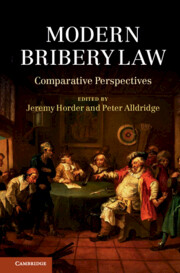Book contents
- Frontmatter
- Contents
- List of contributors
- Table of cases
- Table of statutes and international instruments
- Introduction
- Part I Bribery law: between public wrongdoing and private advantage-taking
- Part II Bribery without borders: tackling corruption in the EU and beyond
- Part III Ill-gotten gains: the challenge of prosecution, enforcement and asset recovery
- 8 Bribery and the changing pattern of criminal prosecution
- 9 Bribery and corruption: the UK framework for enforcement
- 10 Prosecuting bribery in Hong Kong's human rights environment
- 11 Is the UNCAC an effective deterrent to grand corruption?
- Bibliography
- Index
- References
8 - Bribery and the changing pattern of criminal prosecution
from Part III - Ill-gotten gains: the challenge of prosecution, enforcement and asset recovery
Published online by Cambridge University Press: 05 May 2013
- Frontmatter
- Contents
- List of contributors
- Table of cases
- Table of statutes and international instruments
- Introduction
- Part I Bribery law: between public wrongdoing and private advantage-taking
- Part II Bribery without borders: tackling corruption in the EU and beyond
- Part III Ill-gotten gains: the challenge of prosecution, enforcement and asset recovery
- 8 Bribery and the changing pattern of criminal prosecution
- 9 Bribery and corruption: the UK framework for enforcement
- 10 Prosecuting bribery in Hong Kong's human rights environment
- 11 Is the UNCAC an effective deterrent to grand corruption?
- Bibliography
- Index
- References
Summary
Issues
In order for prosecutions to succeed under the Bribery Act 2010, something needs to be done about the prosecution process. This chapter will deal with the introduction, contemporaneously with the Bribery Act 2010, of means of proceeding against defendants that differ radically from the ‘traditional’ prosecution conviction/sentence model of criminal justice. It will concentrate upon self-reporting, negotiation of pleas, deferred prosecution agreements and multilateral transnational agreements. It will consider the recent (almost) challenges to the BAE Systems settlement, the cases of Innospec and Dougall, and more generally the policy of the Serious Fraud Office (SFO) and its successor organisations in this area, and the proposal for the use of deferred prosecution agreements to deal with some types of corporate criminality.
The relationship between, on the one hand, bribery and, on the other, agreements not to prosecute, or agreements not to press for the imposition of the fullest rigour of the law, places a range of problems in particularly vivid relief. There is no clearer case of bribery, whatever the age of the laws and whatever the jurisdiction, than that of paying someone not to prosecute the briber for an offence he or she is alleged to have committed. If a person is able to pay to avoid criminal liability then he or she is not really subject to the criminal law at all. Generality is one of the characteristics of criminal law. One of the clearest indicators of a corrupt society is that it is possible to flex economic muscle so as to avoid the consequences of breaking the law. The fundamental principle is clear and does not admit of shades of grey. Allowing people to pay to avoid criminal proceedings very clearly undermines the rule of law, which requires impartial application of clear rules to everybody. A rule whose effects can be avoided by bribing the appropriate person is a rule whose generality is compromised.
- Type
- Chapter
- Information
- Modern Bribery LawComparative Perspectives, pp. 219 - 250Publisher: Cambridge University PressPrint publication year: 2013
References
- 1
- Cited by



